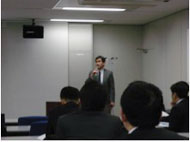Events
Workshop on Slope Failure Caused by Torrential Rainfall in Asian Countries in the Context of Climate Change
Date: March 7, 2011 (13:00 - 17:00)
Venue: Meeting room of West Nippon Expressway Company Limited Osaka, Japan
Organized by:
- Department of Urban Management, Graduate School of Engineering, Kyoto University
- Department of Civil and Earth Resources Engineering, Graduate School of Engineering, Kyoto University
Co-organized by:
- West Nippon Expressway Company Limited
- Kyoto University Global COE Program "Global Center for Education and Research on Human Security Engineering for Asian Megacities"
Number of attendants: about 60
Program (Japanese & English)
Report 143
Outline
Recently, frequency of slope failure events caused by torrential rainfall has been increasing drastically in Asian countries due to "Climate Change". Under the situation, faculty member of Graduate School of Kyoto University initiated joint research project, which is field Monitoring of run-off and moisture infiltration into subsoil at a road slope in Nakhon Nayok, Thailand, jointly with Kasetsart University, Thailand and Asian Institute of Technology, Thailand since September, 2007. In addition, since February, 2010, based on findings obtained through the above research, Graduate School of Kyoto University and West Nippon Expressway Company Limited have conducted joint research project, entitled "A Study on Run-off and Moisture Infiltration into Subsoil Caused by Torrential Rainfall", aiming at getting fundamental data associated with establishment of slope failure early warning system from a viewpoint of road disaster risk mitigation.
The workshop on "Slope Failure Caused by Torrential Rainfall in Asian Countries in the Context of Climate Change" was held at Meeting room of West Nippon Expressway Company Limited, Osaka, Japan on March 7, 2011, aiming at reports of the results of the joint research and associating topics on slope failure in Asian countries, which were made presentation by invited Thai speakers, research counterparts from Kasetsart University, Asian Institute of Technology and Department of Highways, Thailand.
Report
In the workshop, slope failure caused by torrential rainfall and related topics were presented by Dr. Montri Dechasakulsom, Dr. Noppadol Phien-wej, Dr. Suttisak Soralump, Dr. Apiniti Jotisankasa and Prof. Hiroyasu Ohtsu. The topics presented by each speaker were "Disaster Prevention Measures of Highway in Thailand", "Floods and Landslides Events in Asian Countries in 2010", "Early Warning Systems against Landslide in Thailand", "Pore water pressure regime of some slopes in Thailand: A monitoring experience" and Field Monitoring in Nakhon Nayok, Thailand", respectively. All topics were related to slope failure risk mitigation caused by torrential rainfall in Southeast Asian countries, which is the one of main disciplines dealt in our GCOE projects. It should be noted that topics associated with many examples of slope failure event revealed the facts that frequent of slope failure event in Southeast Asian countries has been drastically increasing due to following two reasons. The one is man-made disaster, which is relatively small-scale slope failure due to disorderly land development. The other is natural disaster, which is large-scale slope failure due to "Climate Change". In response to the above findings, the necessity that governmental/provincial agents implemental programs focusing on disaster prevention was pointed out. In detail, as for man-made disaster, the necessity of enforcement of law issuing land development regulation was pointed out as one of feasible solution to copy with slope failure event. On the other hand, as for large-scale slope failure, the establishment of slope failure early warning system aiming at evacuation of local residents was presented as one of the most effective measures from viewpoints of disaster risk mitigation.
In the context of climate change, even in Japan, the necessity of slope disaster prevention against torrential rainfall such as guerilla-like rainfall has been highlighted. Under such the condition, this workshop succeeded to get great concerns of participants and active discussion between presenters and participants. In addition, it revealed that the topics discussed actively in this symposium require interdisciplinary investigation to cope with the difficulties associated with realization of sustainable development and human security for the people who live there, which is actually fitting to the main themes of our GCOE program.
From such viewpoints, the discussion together with researchers and engineers in Southeast Asian countries would surely be useful and important for us to establish disciplines on "Human Security Engineering in Asian Mega-Cites", which is our goal of our activities.

